Event Manager
Entry Level Qualification
12
Career Fields
Business & Management
For Specially Abled





About Career
An event manager develops the plan to manage an event from its initial conception stage to the completion of the event. It involves planning, directing, organizing, and coordinating the whole event along with the other team members.
As an event manager, you will execute all types and sizes of events such as corporate events, food festivals, sports events, seminars, wedding events, music concerts, educational events etc. while doing all executive and managing work such as planning the budget, scheduling the program, assigning the duties, script writing etc. As an event manager, you will be required to do the marketing and promotion work for the event. You may either conduct the event on the demand of the client or may sell your event to the organizations, financial sponsors, etc. You will ensure the success of the event by reaching the target audience while conveying them the message of the event. It is a multi-task job where you will be required to do the managerial, administrative, financial, creative, technical and other kinds of work.
PARTICULARS | DESCRIPTION |
Name | Event Manager |
Purpose | Oversee All Pre-Event Planning |
Career Field | Business & Management |
Required Entrance Exam | CAT, MAT |
Average Salary | 200000 - 400000Rs. Per Year |
Companies For You | Public Relation Agencies, Event Management Consultancies & Many More |
Who is Eligible | Class 12th Pass |
Key roles and responsibilities
As an event manager, you will be required to fulfil the following roles and responsibilities.
1. You will choose a theme for the event as per your agenda. It may be related to culture, art, costumes, colours, literature, weddings, games etc. along with deciding the name and logo to identify it.
2. You will hire the suppliers, workers, and contractors while negotiating the prices with them.
3. You will coordinate with an entire team of workers include managers, suppliers, marketers, salespersons, clients etc. and collaborate with them to interpret all activities in a given period of time and budget.
4. You will consult with the client to know their needs and demands.
5. You will oversee all pre-event planning from deciding the venue to setting timelines and delegating the tasks to the staff members.
6. Ensure the event would go successful without any problem and handle any troubleshoot arises during the event.
7. You will make and collect the payment in time to the vendors, suppliers etc. by preparing invoices and bills.
8. You will motivate, direct and lead your team to derive their best.
9. You will ensure the timely delivery of program at scheduled time and venue.
10. You shall evaluate the reports of post-event for future use.
11. You will engage in promotional activities while coordinating with the marketing team to make advertisements for the event.
12. You will maintain the relationship while communicating with the outside parties such as sponsors, media, contractors, suppliers etc.
13. You might handle the technical work such as arranging lights, audio-visual production, decoration, arranging props etc.
14. You will supervise administrative e work for all events such as maintaining registration booths, allotting parking areas, arranging food and water.
15. You will ensure the safety measures have been taken while complying with the law.
Career Entry Pathway
Class 10 all subjects as per scheme of studies - Class 11-12 with any subject combination as per scheme of studies – Diploma in Event Management/Hospitality Management/ related field.
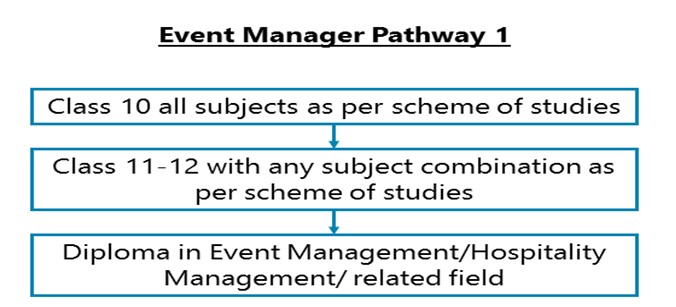
After your secondary level of schooling, you can study Class 11-12 with any subject combination as per scheme of studies in your higher secondary school. Then study for a Diploma course in Event Management/ Hospitality Management/ related field.

After your secondary level of schooling, you can study Class 11-12 with any subject combination as per scheme of studies in your higher secondary school. Then study for a Bachelor’s Degree in Event Management/ Hotel or Catering Management/ Marketing Management / Hospitality Management/ Business Administration.
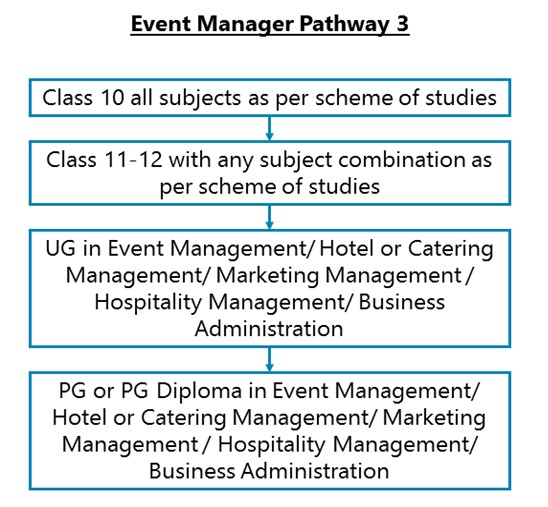
After your secondary level of schooling, you can study Class 11-12 with any subject combination as per scheme of studies in your higher secondary school. Then study for a Bachelor’s Degree in Event Management/ Hotel or Catering Management/ Marketing Management / Hospitality Management/ Business Administration. Now you can study for PG or PG Diploma in Event Management/ Hotel or Catering Management/ Marketing Management / Hospitality Management/ Business Administration.
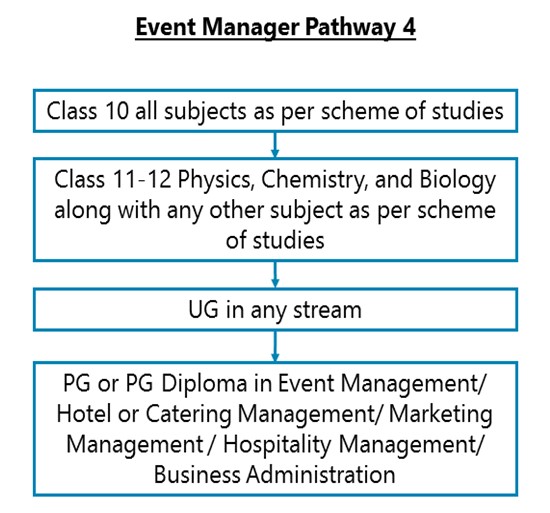
After your secondary level of schooling, you can study Class 11-12 with any subject combination as per scheme of studies in your higher secondary school. Then study for a Bachelor’s Degree in any discipline. After that, you can go for PG or PG Diploma in Event Management/ Hotel or Catering Management/ Marketing Management / Hospitality Management/ Business Administration.
Required Qualification & Competencies
To become an Event Manager, you can do a Bachelor’s degree in any of the following fields or in any other field / subject of your choice.
1. Business Administration
2. Event Management
3. Marketing Management
4. Hospitality Management
You may also do a Post Graduate degree / diploma in any one of the following:
1. Business Administration
2. Event Management
3. Marketing Management
4. Hospitality Management
MINIMUM EDUCATION REQUIRED | MAXIMUM EDUCATION REQUIRED |
Post Higher Secondary Diploma / Certificate Programs for which the minimum eligibility is a pass in Higher Secondary / Class XII School Leaving examination. | Post Graduate Postgraduate Degree / Diploma / Certificate Programs for which the minimum eligibility is a pass in Graduation / equivalent Diploma program like Honours Diploma or Graduate Diploma. |

Competencies Required
Interests
1. Enterprising: You should have interests for Enterprising Occupations. Enterprising occupations involve taking initiatives, initiating actions, and planning to achieve goals, often business goals. These involve gathering resources and leading people to get things done. These require decision making, risk taking and action orientation.
2. Conventional: You should have interests for Conventional Occupations. Conventional occupations involve repetitive and routine tasks as well as fixed processes or procedures for getting things done. These occupations involve working more with data, systems, and procedures and less with ideas or creativity.
3. Social: You should have interests for Social Occupations. Social occupations involve helping or assisting others; these involve working with and communicating with people to provide various services; these may involve educating and advising others.
Abilities
1. Abstract Reasoning: The ability to understand ideas which are not expressed in words or numbers; the ability to understand concepts which are not clearly expressed verbally or otherwise.
2. Articulation: The ability to speak clearly so others can understand you.
3. Deductive Reasoning: The ability to apply general rules and common logic to specific problems to produce answers that are logical and make sense. For example, understanding the reasons behind an event or a situation using general rules and common logic.
4. Emotional Intelligence: The ability to understand your own and others' emotions and feelings; empathy for others; adjusting your behaviour or self-control and self-regulation according to others' emptions and situations.
5. Fluency of Ideas: The ability to come up with a number of ideas about a topic (the number of ideas is important, not their quality, correctness, or creativity).
6. Inter-Personal: The ability to build and maintain good relationships with others at workplaces and elsewhere.
7. Oral Comprehension: The ability to listen to and understand information and ideas presented through spoken words and sentences.
8. Oral Expression: The ability to communicate information and ideas in speaking so others will understand.
9. Originality: The ability to come up with unusual or innovative ideas about a given topic or situation, or to develop creative ways to solve a problem.
10. Problem Sensitivity: The ability to tell when something is wrong or is likely to go wrong. It does not involve solving the problem, only recognizing there is a problem.
11. Selective Attention: The ability to concentrate on a task over a long period of time without being distracted.
12. Verbal Reasoning: The ability to think and reason with words; the ability to reason out ideas expressed in words.
13. Written Comprehension: The ability to read and understand information and ideas presented in writing.
14. Written Expression: The ability to communicate information and ideas in writing so others will understand.
Knowledge
1. Administration: Knowledge of various administrative and operational functions in managing a business or an organisation such as general administration, facility management, front office management, back office management, etc.
2. Customer Service: Knowledge about how to provide customer services. This includes understanding customer needs, helping customers to use products and services, answering customer queries, handling customer complaints and grievances, and evaluating customer satisfaction.
3. Marketing: Knowledge of the various principles, theories, methods, systems and processes to understand the needs of a category of customers and then creating, communicating, and delivering various products and services in order to satisfy the needs of the customers.
4. Sales and Promotion: Knowledge of the various principles, theories, methods, systems and processes to communicate and promote the benefits of various products or services of an organisation to a targeted group of customers, influencing their buying decisions and convincing them to buy the products or services.
Skills
1. Active Learning: Focused and continuous learning from various sources of information, observation and otherwise for application in getting work done.
2. Active Listening: Giving full attention to what other people are saying, understanding the points being made by others, asking questions, etc.
3. Coordination: Skills in working together with other people to get things done.
4. Directing: Skills in directing others' actions to get things done.
5. Judgment and Decision Making: Skills in considering pros and cons of various decision alternatives; considering costs and benefits; taking appropriate and suitable decisions.
6. Managing Human Resources: Skills in motivating, developing, and leading people as they work, identifying the best people for the job.
7. Negotiation: Skills in bringing others together and trying to reconcile differences.
8. Persuasion: Skills in persuading others to change their minds or behaviour.
9. Problem Solving: Skills in analysis and understanding of problems, evaluating various options to solve the problems and using the best option to solve the problems.
10. Reading Comprehension: Skills in understanding written sentences and paragraphs in work related documents.
11. Selling: Skills in promoting and canvassing about various products and services to prospective customers; influencing their decisions to buy the products and services; and making sure that they get the delivery of the products and services.
12. Service Orientation: Skills in or keen interest to help and assist people.
13. Supervising: Skills in Supervising and monitoring performance of others, businesses, and different projects.
14. Time Management: Skills in prioritizing work, managing time effectively.
Personality
1. You are always or mostly organised in your day-to-day life and activities.
2. You always feel secure in your surroundings and in most situations.
3. You are always self-satisfied or feel satisfied with your life in most situations.
4. You are a soft-hearted person sometimes.
5. You trust others sometimes but not always.
6. You are helpful to others sometimes.
7. You remain calm in difficult situations sometimes but some other times you are anxious.
8. You are imaginative sometimes.9. You prefer to experience new things and have new experiences sometimes.
9. You act independently sometimes but do not do so in some other times.
10. You are friendly and outgoing sometimes, but not always. You prefer company of people sometimes but not always.
11. You are caring, supportive, sympathetic and kind to others sometimes.
Career - Job Opportunities & Profiles
As an event manager, you will get various job opportunities at Hotels, Charitable Organizations, Large Commercial Organization, Public Relation Agencies, Event Management Consultancies, Universities, Local Authorities, Event Planners, Wedding Planners, etc.
1. You can start your career as an Assistant Event Manager at various commercial organizations, event management consultancies, etc.
2. Many organizations will hire you as an event coordinator.
3. Some of you may get managerial positions at a junior level such as junior sales manager, marketing manager, assistant manager, etc. based on specific roles.
Work environment
As an event manager, you will work at normal office hours while planning the event, mostly you may need to work at additional hours including evenings and weekends. Most of the events are executed at night such as wedding and concerts, so may work for long hours while these events are going on. Most event managers work from their office but sometimes you will be required to work in the field while executing and delivering the event, meeting clients, travelling often to visit the venues etc. So, you must be ready to face the pressure while meeting the targets and deadlines. Please note that during the end time before the event, many times workload increases many folds and you might be working nonstop without a break. This is a big challenge in the events business.
Career Growth
1. As an assistant event manager, you will move to the position of senior event manager, Head of Events, etc.
2. In smaller organizations, the career growth will be from a team leader, event director, project director.
3. In large organizations, managerial jobs will grow into Public Relation Officer, Event Production Head, Management Consultant Head, Deputy Manager.
4. After gaining many years of experience, you may work as a Freelance Event Management Consultant.
Salary Offered
1. At the entry level, an assistant event manager would earn Rs. 15,000 to 20,000 per month. A junior manager will earn Rs. 15,000 to 100,000 per month. An event coordinator will earn Rs. 20,000 to 40,000 per month.
2. At junior level after working 2-6 years, you will earn anything between Rs. 35,000 to 60,000 per month.
3. At mid-level after working 6-12 years, you will anything between Rs. 60,000 to 2,50,000 per month.
4. At senior level after working for more than 12 years, you will earn Rs. 1,00,000 to 3,00,000 per month. As an event head, you may earn Rs. 2,00,000 to 4,00,000 per month.
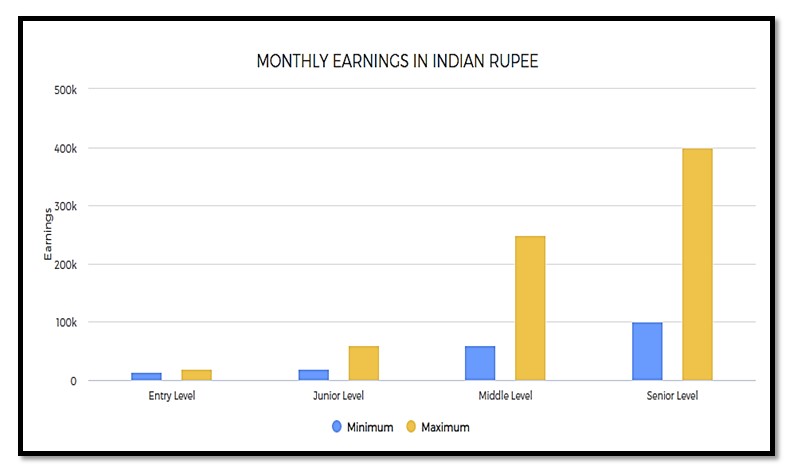
Monthly Earnings In Indian Rupee
Entry Level | Junior Level | Mid Level | Senior Level | ||||
Min Earning | Max Earning | Min Earning | Max Earning | Min Earning | Max Earning | Min Earning | Max Earning |
15000 | 20000 | 20000 | 60000 | 60000 | 250000 | 100000 | 400000 |
1. Entry level: 0 - 2 years of work experience
2. Junior Level: From 1 to 12 years of work experience
3. Mid-Level: From 5 to 20+ years of work experience
4. Senior Level: From 10 to 25+ years of work experience (there could be exceptions in some high-end technical, financial, engineering, creative, management, sports, and other careers; also in the near future, people will reach these levels much faster in many careers and in some careers, these levels will have no meaning as those careers will be completely tech skill driven such as even now, there is almost no level in a Cyber Security Expert’s job)
Work Activities
1. Addressing grievances and resolving conflicts: Handling complaints and grievance to resolve; resolving conflicts among co-workers or others at workplace or outside in relation to your work.
2. Analysing and interpreting data and information: Analysis of data and information to find facts, trends, reasons behind situations, etc.; interpretation of data to aid in decision making.
3. Communicating with co-workers and others: Communicating with people in writing, verbally or otherwise inside your workplace and various other people who have professional relationships with your place of work including vendors, government officials, etc. or with people at large.
4. Communicating with customers: Communicating with potential and existing customers of your organisation in writing, verbally or otherwise.
5. Creative thinking: Developing new ideas, concepts, innovative solutions to problems, newer ways of getting things done, designing products and services, creating work of art and craft, etc.
6. Decision making and problem solving: Analysis of data and information; evaluation of alternative decisions and results of decisions; taking the right decisions and solving problems.
7. Developing and maintaining inter-personal relationships: Developing professional relationships with co-workers and others outside organisations and maintaining good relationships.
8. Estimating quantity, cost, time and resources: Estimating sizes, volumes, distance, and quantity; estimating and determining time, costs, and resources; estimating materials required to perform a task.
9. Getting Information and learning: Observing, hearing, reading, using computers, or otherwise obtaining information and learning from it.
10. Handling administrative activities: Handling various administrative tasks and managing day-to-day operations.
11. Inspecting situations, events, and people: Inspecting situations, events and people to understand the reasons and causes for the situation or events to happen; inspecting people to understand reasons behind their behaviour and actions.
12. Managing and supervising: Manging and supervising work of others; setting goals; giving instructions; monitoring work performance, etc.
13. Negotiating: Negotiating terms, conditions, costs, prices and about other issues.
14. Organising, planning and prioritising tasks: Planning and organising tasks in order to achieve work goals; prioritising tasks to achieve goals and making the best use of the time available.
15. Providing advices and consultation to others: Giving advices or consultation to others about various issues, conceptual matters, know-hows, scientific matters, products or services.
16. Recruiting, enlisting and placing people resources: Sourcing, recruiting, selecting, enlisting and placing people in different positions and tasks in an organisation or for getting work done.
17. Scheduling tasks: Scheduling project timelines, tasks and activities.
18. Selling: Communicating about products and services with potential customers; influencing customers' decisions to buy products and services; helping people to buy products and services.
19. Updating and using relevant knowledge: Keeping updated with the latest knowledge relevant to your fields of work and use of the relevant knowledge in getting things done.
20. Using computers for work: Using computers for day-to-day office work; using computer software for various applications in day-to-day professional work; entering data and process information; for writing.
21. Working in a team: Working in a team of people; developing team; maintaining professional relationships among team members.
Future Prospects
Career opportunities in the event management field are expected to rise in coming years. Indians generally spend lavishly on parties, weddings, etc. Along with these, more and more business events like Product launch event, pre-launch event, corporate events, Bollywood events, concerts and shows, sports events, etc. will be on the rise. Entertainment events are on the rise with more purchasing power with people, more events coming up.
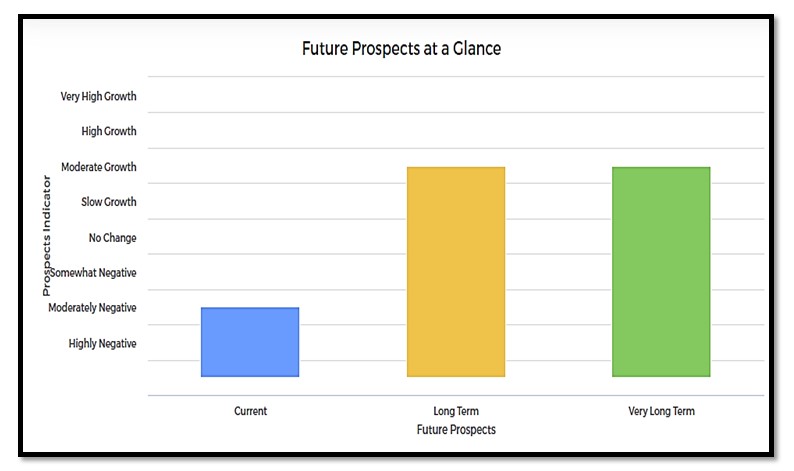
Future Prospects At A Glance
Current (0-1 year) | Long Term (2-5 year) | Very Long Term (6-10 years) |
Moderately Negative | Moderate Growth | Moderate Growth |


